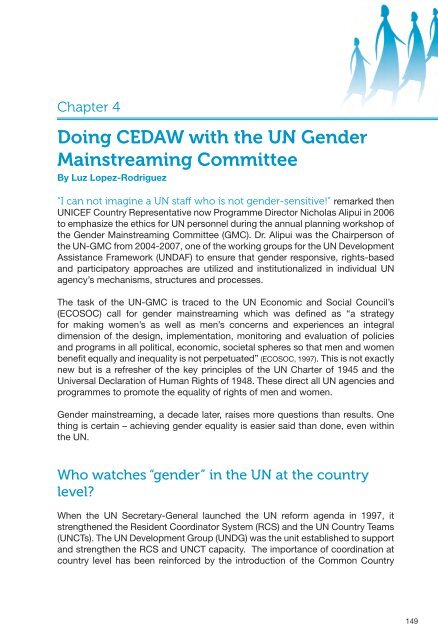Section 3 - Educating and Partnering for CEDAW
Section 3 - Educating and Partnering for CEDAW
Section 3 - Educating and Partnering for CEDAW
You also want an ePaper? Increase the reach of your titles
YUMPU automatically turns print PDFs into web optimized ePapers that Google loves.
Chapter 4<br />
Doing <strong>CEDAW</strong> with the UN Gender<br />
Mainstreaming Committee<br />
By Luz Lopez-Rodriguez<br />
“I can not imagine a UN staff who is not gender-sensitive!” remarked then<br />
UNICEF Country Representative now Programme Director Nicholas Alipui in 2006<br />
to emphasize the ethics <strong>for</strong> UN personnel during the annual planning workshop of<br />
the Gender Mainstreaming Committee (GMC). Dr. Alipui was the Chairperson of<br />
the UN-GMC from 2004-2007, one of the working groups <strong>for</strong> the UN Development<br />
Assistance Framework (UNDAF) to ensure that gender responsive, rights-based<br />
<strong>and</strong> participatory approaches are utilized <strong>and</strong> institutionalized in individual UN<br />
agency’s mechanisms, structures <strong>and</strong> processes.<br />
The task of the UN-GMC is traced to the UN Economic <strong>and</strong> Social Council’s<br />
(ECOSOC) call <strong>for</strong> gender mainstreaming which was defined as “a strategy<br />
<strong>for</strong> making women’s as well as men’s concerns <strong>and</strong> experiences an integral<br />
dimension of the design, implementation, monitoring <strong>and</strong> evaluation of policies<br />
<strong>and</strong> programs in all political, economic, societal spheres so that men <strong>and</strong> women<br />
benefit equally <strong>and</strong> inequality is not perpetuated” (ECOSOC, 1997). This is not exactly<br />
new but is a refresher of the key principles of the UN Charter of 1945 <strong>and</strong> the<br />
Universal Declaration of Human Rights of 1948. These direct all UN agencies <strong>and</strong><br />
programmes to promote the equality of rights of men <strong>and</strong> women.<br />
Gender mainstreaming, a decade later, raises more questions than results. One<br />
thing is certain – achieving gender equality is easier said than done, even within<br />
the UN.<br />
Who watches “gender” in the UN at the country<br />
level<br />
When the UN Secretary-General launched the UN re<strong>for</strong>m agenda in 1997, it<br />
strengthened the Resident Coordinator System (RCS) <strong>and</strong> the UN Country Teams<br />
(UNCTs). The UN Development Group (UNDG) was the unit established to support<br />
<strong>and</strong> strengthen the RCS <strong>and</strong> UNCT capacity. The importance of coordination at<br />
country level has been rein<strong>for</strong>ced by the introduction of the Common Country<br />
149

















